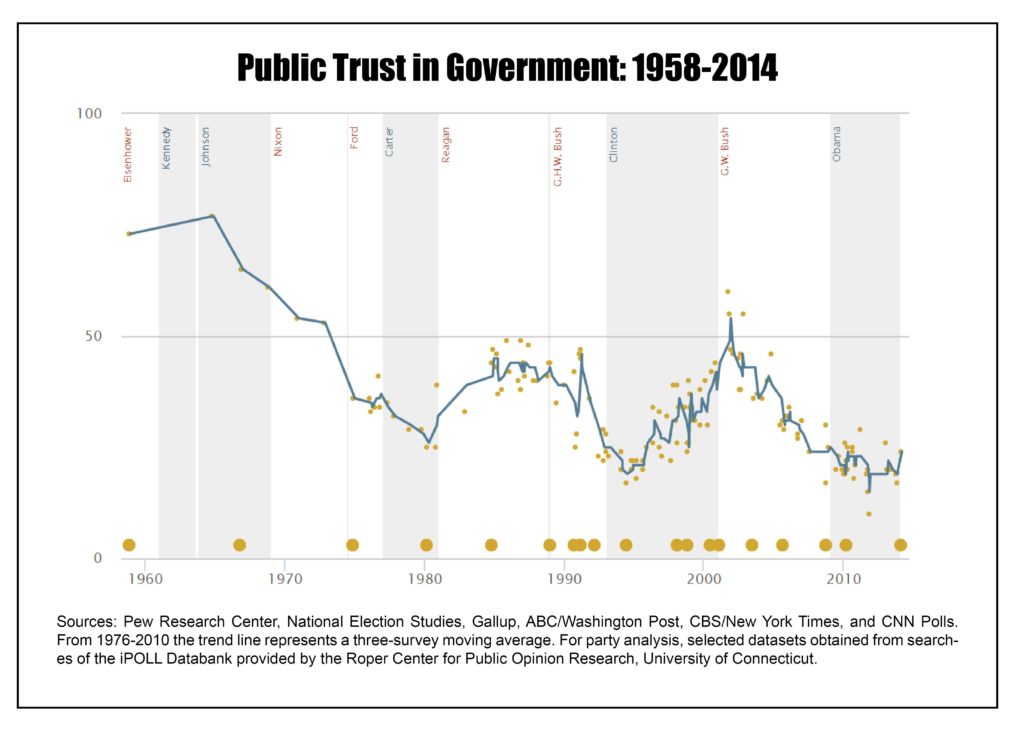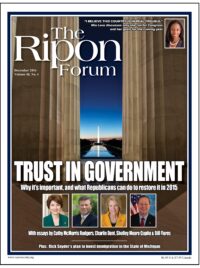
Michael Dimock is president of the Pew Research Center. A survey researcher and political scientist by training, he oversees the center’s overall operations and research agenda.
The Pew Research Center is a nonpartisan fact tank that informs the public about the issues, attitudes and trends shaping America and the world. It conducts public opinion polling, demographic research, media content analysis and other empirical social science research.
The center focuses on several research areas: U.S. politics and policy; media and journalism; social and demographic trends; internet, science and technology; Hispanic trends; global attitudes and trends; and religion and public life.Pew Research does not take policy positions. It is a subsidiary of The Pew Charitable Trusts.
The FORUM recently asked Dimock about the low-level of trust Americans have toward the federal government and how it compares to past years.
______________________________
RF: Trust in government is at an all-time low. How did we get to this point?
MD: As our reports on views of government have shown, public trust in the federal government first began declining in the 1970s, with Watergate and the Vietnam War. In fact, prior to Ronald Reagan’s election as president in 1980, the percentage saying they could trust the federal government always or most of the time had sunk to 28 percent – roughly half the level it had been a decade earlier. Even so, the last 10 years have seen a prolonged period during which trust has remained at or near historic lows.
There are many causes for this, and our 2010 report on trust in government outlined some of them: “a dismal economy, an unhappy public, bitter partisan-based backlash, and epic discontent with Congress and elected officials.” Though there has been a modest increase in positive views of the economy since then, those conditions largely persist today.
RF: Is this basic lack of trust shared by all of the public, or are there some groups who still have faith that government will do the right thing?
MD: Majorities across all demographic groups express low levels in trust in government. That said, currently, young people and minorities are more likely to trust government at least most of the time, compared with older Americans and whites.
There is also a partisan factor that varies with changes in administrations. Democrats tend to hold more positive views of government, though these views often fall a bit under Republican administrations. Republicans express much higher levels of confidence in government when a Republican administration is in the White House, but that confidence plummets under Democratic administrations.
RF: How does this era compare to other moments in American history when trust in government was low, such as the post-Watergate era of the mid- to late-1970’s?
MD: The current levels of trust in the federal government are similar to those of the late 1970s and the early 1990s. Trust was at a particularly low ebb in 1994 (Clinton’s second year), just prior to the Republican revolution.
Again, what the current period has in common with those earlier times is a gloomy national outlook and widespread pessimism about the nation’s economy.

The current levels of trust in the federal government are similar to those of the late 1970s and the early 1990s. Trust was at a particularly low ebb in 1994 (Clinton’s second year), just prior to the Republican revolution.
RF: Trust in government increased by around 20 percentage points during the presidencies of both Ronald Reagan and Bill Clinton. Is this because the economy also grew during their presidencies, or are there other factors as well?
MD:An improving economy was a factor, definitely. Still, the data show that trust in government was more consistently positive during Reagan’s second term than in Clinton’s second term, though both were periods of robust economic growth.
In part, this may reflect the impeachment of Clinton during his second term. In addition, Reagan and Clinton were popular presidents whose predecessors – particularly Carter – were much less popular. Trust in government rose substantially immediately following Reagan’s election – before he even took office, and remained substantially higher throughout his administration than it had been when Carter was in office.
RF: Of course, government isn’t the only institution that people are losing faith in. From religious organizations to the news media, people are losing faith in other institutions also. Is there a common thread or underlying current that is breeding distrust in our society?
MD: To some degree it depends on the institution. The military, for instance, continues to be viewed very favorably. Views of labor unions and business corporations recovered in 2013, after plummeting earlier this decade. And the public continues to hold state and local governments in fairly high regard, even as views of the federal government have grown much more negative, as shown in our April 2013 report on views of government.
The federal government and its three branches have taken perhaps the heaviest toll. Even the Supreme Court is viewed much more negatively than in the past.
RF: What is the role of the news media in all of this? Is the seemingly endless coverage of partisan conflict and political strife driving trust in government down?
MD: It’s difficult to say how much of a factor, if at all, the news media have played. We do know that over the course of the last 10 years – a period of continued low levels of trust in the federal government – there has been a fragmentation of the public’s news sources and a rise of ideological media.
The perception of dysfunction in Washington, along with a persistent sense of economic insecurity, is clearly weighing down views of government.
On the other hand, trust in government was nearly as low in the late 1970s, when the public relied on a handful of news sources – the three major networks, as well as national and local daily newspapers. And that was decades before the rise of outlets such as Fox News, MSNBC and the Daily Show with Jon Stewart.
RF: How do we turn things around and get people to trust government again? Are there any lessons from the past that could serve as guideposts for today?
MD: Overall, when people feel insecure, they will hold leaders to task. The perception of dysfunction in Washington, along with a persistent sense of economic insecurity, is clearly weighing down views of government. And just as with interpersonal relationships, trust in government can be lost easily, but takes a lot of time, effort and consistent performance to win back. There is no single factor, silver bullet or flip of a switch that builds trust immediately.




